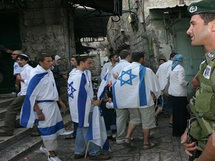Book exposes Israeli occupation as seen by troops
Gavin Rabinowitz
JERUSALEM, Gavin Rabinowitz- Some stories are told with shame; others are just matter-of-fact accounts, but the dozens of soldier testimonies in a book to be released this month lays bare the grim day-to-day reality of Israel's occupation of the Palestinian territories.
"Breaking the Silence" shares the name of its publishers, a group of veteran Israeli combat soldiers who collect testimonies and photographs from troops who have served in the West Bank and Gaza Strip.

"The book exposes the operational methods of the Israeli military in the West Bank and Gaza Strip, and the impact of these methods on the people who live in the territories -- Palestinians, settlers and the soldiers themselves," reads the introduction in an advance copy obtained by AFP.
The book targets ordinary Israelis and tries to show that, contrary to the army's claims that its actions are purely defensive, the policy on the ground is "an offensive one which includes expropriation of territory, tightening control over the civilian population and instilling fear."
"We demand accountability regarding Israel's military actions in the occupied territories perpetrated by us and in our name," the group wrote.
In reaction, the army said Breaking the Silence "continues to behave towards the IDF (Israeli Defence Forces) in an unfair manner that raises significant questions as to its intentions.
"The organisation has been reminded countless times that it is welcome to present its testimonies and evidence to the appropriate law enforcement agencies so they can conduct a full and professional inquiry.
But the group "has chosen to act otherwise, and has released to the media a jumble of information without permitting the investigative authorities to complete their work.
"It is unfortunate that Breaking the Silence continues to employ such methods, especially in light of its repeated calls that justice be served."
The 431-page tome contains more than 100 anonymous testimonies collected since the group began operating in 2004, illustrating different aspects of military policy as seen through the eyes of the ordinary soldier.
Yehuda Shaul, one of the group's founders, said "some of this has been published before, but much is new. We have collected over 700 testimonies and this book uses more than 100, which we put together to illustrate our understanding of what has been happening over the last decade."
The first part of the book details random shootings, tales of keeping entire villages awake at night, arbitrary house searches initiated by bored commanders and even orders to kill unarmed men suspected of being lookouts.
All the stories are told in the soldiers' own words -- much of it peppered with military slang.
"An unarmed man walking on the roof, walking around. We reported it to the company commander. The company commander said: 'Take him down.' (The sharp-shooter) fired, took him down," said a paratrooper, describing an incident in the West Bank city of Nablus at the height of the uprising.
"The company commander decreed, decided on the radio, a death sentence for that man. An unarmed man," he said.
Another section highlights the army's policies for controlling the Palestinian civilian population, including a separate road system, curfews, beatings, detentions and endless waits at roadblocks and checkpoints.
"We would detain whoever we felt like," said a soldier, describing his experience manning a roadblock. "It could go up to eight or nine hours. Until we'd get tired of it."
The final chapter examines the complex relationship between the IDF and Jewish settlers in the West Bank.
"While the Palestinians are controlled by the use of threats and military force, soldiers' testimonies describe how the IDF serves, trains and advances the political ambitions of settlers in the territories at the expense of the Palestinian population," the book says.
Testimonies describe protecting settlers while they attack Palestinians, soldiers taking orders from settlers and a military that refrains from enforcing laws against the settlers.
Settlers "just went into the Casbah and started spraying bullets in the air. On automatic. Our treatment of them was too forgiving. We didn't stop them," said a paratrooper who served in Hebron in 2002.
-------------------------------------------------------------------------------